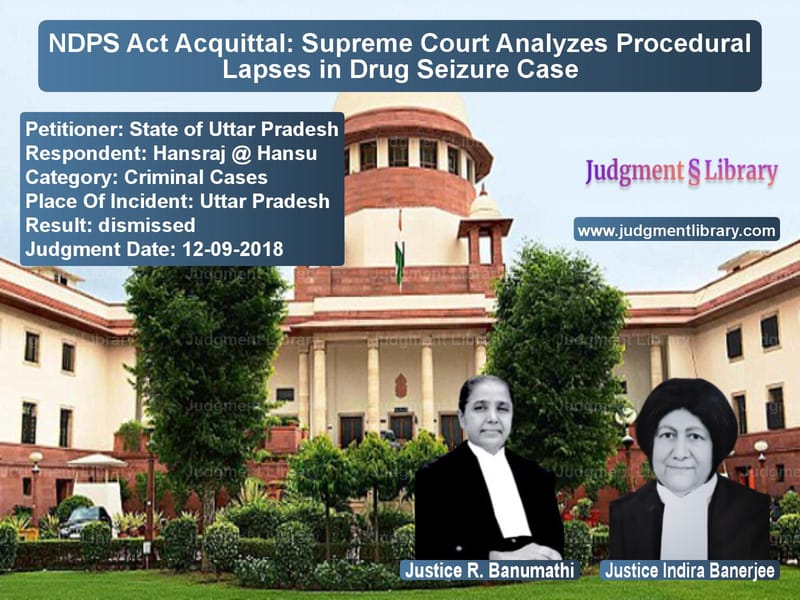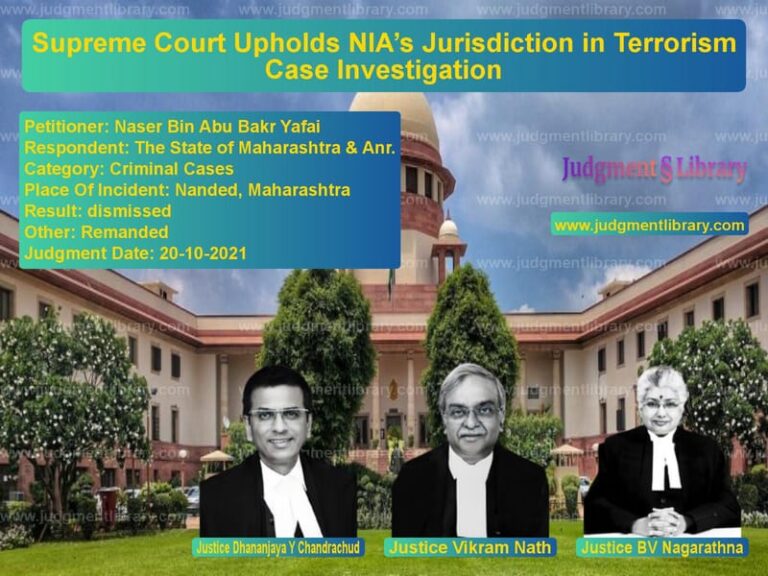NDPS Act Acquittal: Supreme Court Analyzes Procedural Lapses in Drug Seizure Case
On 12th September 2018, the Supreme Court of India delivered an important ruling in State of Uttar Pradesh v. Hansraj @ Hansu, a case concerning drug possession under the NDPS Act and alleged violations of the Excise Act. The key issue in this case was whether procedural lapses in handling the seized contraband justified the acquittal of the accused.
The judgment reaffirmed the necessity of strict compliance with procedural safeguards under the Narcotic Drugs and Psychotropic Substances Act (NDPS Act). The Court held that failure to maintain the integrity of seized substances, including delays in sending samples for testing and lack of evidence on their custody, can lead to an acquittal.
Background of the Case
The case arose from an incident on 17th July 1998, when a police team, while on patrolling duty, received a tip-off about the accused, Hansraj @ Hansu, transporting illegal liquor and narcotics. The police intercepted him and allegedly found:
- 2700 pouches of country-made liquor stored in 18 plastic bags
- 300 grams of charas (cannabis resin) in his pocket
The prosecution charged the accused under:
- Section 20(b)(ii) of the NDPS Act (possession of narcotic substances)
- Section 60 of the Excise Act (illegal liquor possession)
The Trial Court convicted the accused, sentencing him to:
- 10 years of rigorous imprisonment under the NDPS Act
- A fine of ₹1,00,000
- 1-year rigorous imprisonment under the Excise Act
The accused appealed to the Allahabad High Court, which overturned the conviction, citing procedural lapses. The State of Uttar Pradesh then challenged this decision before the Supreme Court.
Legal Issues and Key Questions
The Supreme Court considered the following issues:
- Did the delay in sending the seized samples to the forensic lab affect the reliability of the prosecution’s case?
- Was there sufficient evidence to establish the integrity of the seized contraband from recovery to examination?
- Was the prosecution’s failure to examine key witnesses sufficient to acquit the accused?
Arguments by the Appellant (State of Uttar Pradesh)
The prosecution, represented by Mr. Garvesh Kabra, argued:
- The police had received credible information and conducted a valid search.
- The accused was caught red-handed with a significant quantity of contraband.
- There was no break in the chain of custody, as the seized items were deposited in the police station and then sent for forensic examination.
- The High Court erred in disregarding the testimonies of police officers who conducted the seizure.
Arguments by the Respondent (Hansraj @ Hansu)
The defense, represented by Ms. Nidhi, countered:
- There was an unexplained delay of over a month (from 17th July 1998 to 22nd August 1998) in sending the samples for forensic analysis.
- The prosecution failed to produce evidence regarding how the samples were stored and who handled them during this period.
- Key witnesses, including the constables who transported the samples to the laboratory, were not examined.
- The integrity of the evidence was compromised, making it unreliable for conviction.
Supreme Court’s Observations
The Supreme Court, comprising Justice R. Banumathi and Justice Indira Banerjee, closely examined the procedural safeguards under the NDPS Act.
The Court held:
“There was a delay in sending the seized contraband for forensic examination. There is no evidence on how and in what condition the recovered contraband was kept before being sent for testing.”
The Court emphasized the importance of maintaining a strict chain of custody in NDPS cases, stating:
“It was incumbent on the prosecution to show how and in what conditions the articles were preserved at the police station and transported safely for examination.”
The Court also noted:
“The failure of the prosecution to examine the constables who transported the samples weakens its case.”
Final Judgment
The Supreme Court upheld the High Court’s acquittal of the accused, ruling:
“Upon appreciation of evidence, the High Court has taken a reasonable view that the guilt of the accused has not been established beyond a reasonable doubt.”
The appeal by the State of Uttar Pradesh was dismissed.
Impact of the Judgment
This ruling reinforces the principle that strict compliance with procedural safeguards is essential in NDPS cases. Key takeaways include:
- Delays in forensic testing: Unexplained delays in sending samples for testing can raise serious doubts about the integrity of the evidence.
- Importance of chain of custody: The prosecution must demonstrate a clear and uninterrupted chain of custody for seized contraband.
- Burden of proof on prosecution: The State must prove that the evidence remains unaltered from seizure to testing.
- Witness examination: Failure to examine key witnesses who handled evidence can weaken the case.
This judgment serves as a reminder that procedural safeguards under the NDPS Act are not mere formalities but essential protections against wrongful conviction.
Petitioner Name: State of Uttar Pradesh.Respondent Name: Hansraj @ Hansu.Judgment By: Justice R. Banumathi, Justice Indira Banerjee.Place Of Incident: Uttar Pradesh.Judgment Date: 12-09-2018.
Don’t miss out on the full details! Download the complete judgment in PDF format below and gain valuable insights instantly!
Download Judgment: State of Uttar Prade vs Hansraj @ Hansu Supreme Court of India Judgment Dated 12-09-2018.pdf
Direct Downlaod Judgment: Direct downlaod this Judgment
See all petitions in Drug Possession Cases
See all petitions in Evidence Law
See all petitions in Bail and Anticipatory Bail
See all petitions in Judgment by R. Banumathi
See all petitions in Judgment by Indira Banerjee
See all petitions in dismissed
See all petitions in supreme court of India judgments September 2018
See all petitions in 2018 judgments
See all posts in Criminal Cases Category
See all allowed petitions in Criminal Cases Category
See all Dismissed petitions in Criminal Cases Category
See all partially allowed petitions in Criminal Cases Category







